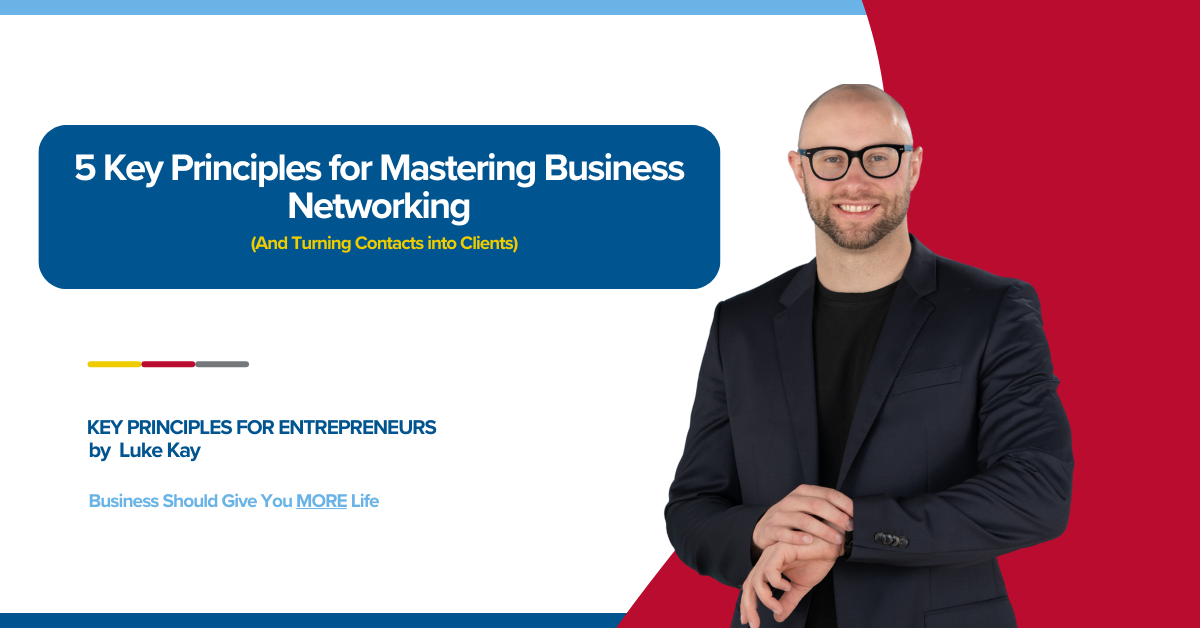
Most business owners dread networking.
The thought of walking into a room full of strangers, armed with business cards, is daunting isn’t it? When you leave you just hope that someone actually remembers your name.
In fact, real networking has nothing to do with how many cards you hand out.
It’s about influence, trust, and building opportunities that last.
When you get really good at business networking, you stop chasing leads. You create genuine relationships that turn into clients, partnerships, and referrals, instead.
So, how do you make networking work for you? Let’s break down 5 simple strategies to help you nail it, every time you walk into the room.
Key Principle #1: Make People Feel Important, Safe, and Happy
Dale Carnegie said it best in his self-help book: “How to Win Friends and Influence People” If you want people on your side, focus less on yourself and more on how you make them feel.
An easy way to remember this? MM FISH – “Make Me Feel Important, Safe, and Happy.”
Every time you meet someone, ask yourself: did they leave the conversation feeling better than when it started?
Key Principle #1 Case Study: HyperFinity
The founders of tech start-up HyperFinity didn’t walk into rooms with hard pitches, they listened. This mindset is what helped the company grow quickly.
By making investors and clients feel valued and understood, they built trust, which soon turned into their first major contracts.
Key Principle #2: Pay Attention to Body Language
How you show up matters more than what you say.
First impressions happen in seconds. People decide whether they trust you long before you’ve finished your first sentence.
Studies suggest around 55% of communication is body language, 38% is tone, and only 7% is the words themselves.
Smile, keep your body language relaxed, your posture open and make eye contact.
Even little things, like showing your palms when you talk, naturally tell people ‘I’m being straight with you.’
Key Principle #2 Case Study: Joe & The Juice UK
When managers at Joe & The Juice UK trained staff on body language; posture, smiles, and tone of voice, they noticed a clear boost in customer trust.
These subtle changes helped build loyalty and drive repeat visits, not just in stores but also at events.
Key Principle #3: Give Before You Get
The strongest networkers don’t go into a room asking, “What can I sell?” They ask, “What can I give?”
It might be a piece of advice, an introduction, or just bringing good energy.
When you give first, people want to naturally return the favour. This can happen in the form of opportunities, referrals, or business.
Key Principle #3 Case Study: Evoluted
Creative agency Evoluted made a name for themselves by actively referring work to other agencies and freelancers.
By giving opportunities away instead of guarding them, they built strong relationships, and this attitude later led to landing major clients like the University of Sheffield.
Key Principle #4: Follow Up and Follow Through
Most often than not, this is where most people fall down. They have a great chat, swap details… and then never follow up. Imagine planting seeds and never watering them, but then expecting it to flower, crazy right?
The follow-up is where the magic happens. Send that Intro email. Share the article you mentioned. Book the coffee you promised. Send that LinkedIn message.
And when you say you’ll do something, actually do it. That consistency builds trust faster than anything else.
Key Principle #4 Case Study: The Cambridge Satchel Company
Founder Julie Deane made follow-up her superpower. After networking events, she always stayed in touch with buyers and journalists. Her persistence and reliability helped her brand land features and partnerships, eventually breaking into Harrods.
Key Principle #5: Be Consistent Over Time
Networking isn’t about showing up once. It’s about showing up again and again until people know, like, and trust you.
When you attend regularly, you become familiar. Familiarity builds comfort. Comfort builds trust. And trust is what leads to opportunities.
Key Principle #5 Case Study: Federation of Small Businesses
A small accountancy firm in Leeds built nearly 40% of its client base simply through attending monthly FSB meetings over time. Not one big event, just steady, consistent effort that kept them top of mind.
Wrapping It Up
Business networking isn’t about swapping cards or delivering your pitch on repeat. It’s about:
- Making people feel valued
- Showing up with confidence
- Giving before you get
- Doing what you said you’d do
- And staying consistent over time
Stick to these five principles, and you’ll stop wasting time on shallow connections. Instead, you’ll build the kind of relationships that fuel long-term business growth.
Take Action
If you’re tired of “networking for the sake of it” and want to actually turn contacts into clients, book a free clarity call with me today. Together, we’ll create a strategy that makes networking pay off.
Events
Grow Faster—With People Who Get It
Business can be lonely when no one around you really gets the pressure, the decisions, and the constant spinning plates. That’s why we run regular events through our Entrepreneurship Academy and 1-2-1 Business Coaching Programmes, to bring ambitious entrepreneurs together.
Attend one of our monthly business growth MasterCLASSes or build your quarterly plan at one of our energetic 90-Day Planning Workshops. You’ll get fresh strategies, honest conversations, and a supportive environment that actually moves the needle.
First-time? Come along for free. No sales pitch, just a powerful session that could change the game for you.





